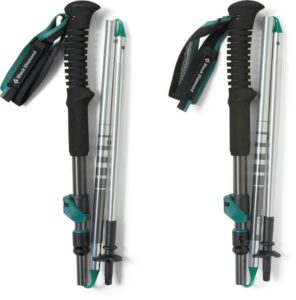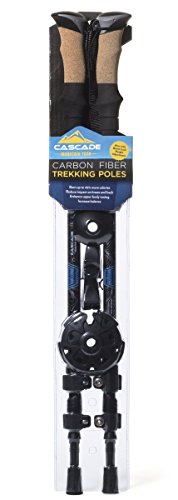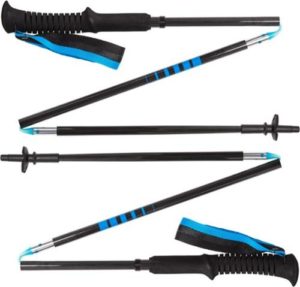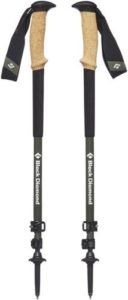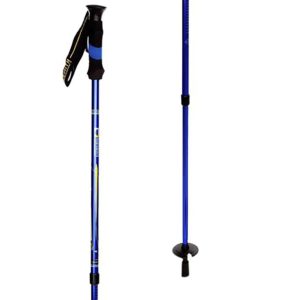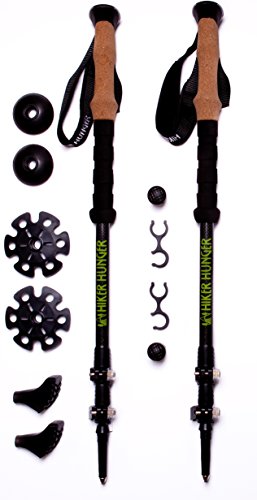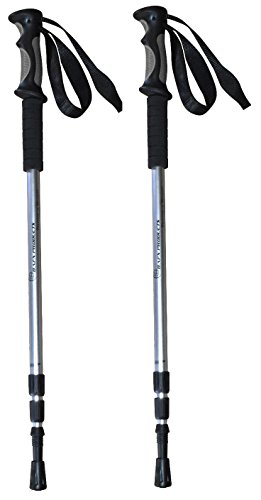You want to be able to cover a lot of ground on your hiking and backpacking trips. But after a few miles, you feel it in your knees. The best hiking poles can give you the support you need to finish your hike pain-free.
When you use hiking poles, you improve your stability and lessen the impact of each step. Hiking poles give you extra support and redistribute the weight you carry. The less force on your knees, the longer you can you stay out on the trail and enjoy your hike.
How do you know which hiking poles are right for you? In this article, we’ll look at several models and help you find which ones are equipped with the features that work best for your hiking needs.
For more of our top hiking accessory recommendations, check out these popular articles:
Compact Binoculars | Hand Warmers | Survival Multi-Tools | Hiking Compasses
Quick Answer - The Best Hiking Poles
- Leki Micro Vario Carbon
- Black Diamond Distance FLZ
- Cascade Mountain Tech Carbon Fiber
- Black Diamond Distance Carbon Z-Pole
- Black Diamond Alpine Carbon Cork
- Leki Micro Vario COR-TEC
- Mountainsmith Rhyolite
- Leki Corklite
- Hiker Hunger Carbon Fiber
- BAFX Products Anti-Shock
Comparison Table - Best Trekking Poles for Hiking
For the best experience turn your device horizontally| Name | Shaft Material | Grip Material | Adjustable | Price | Rating | Review |
|---|---|---|---|---|---|---|
| Leki Micro Vario Carbon | Carbon Fiber | Foam | Yes | $$$ | 4.9 | Read Review |
| Black Diamond Distance FLZ | Aluminum | Foam | Yes | $$ | 4.6 | Read Review |
| Cascade Mountain Tech Carbon Fiber | Carbon Fiber | Cork | Yes | $ | 4.5 | Read Review |
| Black Diamond Distance Carbon Z-Pole | Carbon Fiber | Foam | No | $$ | 4.5 | Read Review |
| Black Diamond Alpine Carbon Cork | Carbon Fiber | Cork | Yes | $$$ | 4.3 | Read Review |
| Leki Micro Vario COR-TEC | Aluminum | Cork/Rubber | Yes | $$$ | 4.9 | Read Review |
| Mountainsmith Rhyolite | Aluminum | Foam | Yes | $ | 4.1 | Read Review |
| Leki Corklite | Aluminum | Cork/Rubber | Yes | $$$ | 4.5 | Read Review |
| Hiker Hunger Carbon Fiber | Carbon Fiber | Cork | Yes | $$ | 4.8 | Read Review |
| BAFX Products Anti-Shock | Aluminum | Rubber | Yes | $ | 4.3 | Read Review |
| Name | Shaft Material | Grip Material | Adjustable | Price | Rating | Review |
Reviews - The Best Trekking Poles
Leki Micro Vario Carbon
BEST OVERALL HIKING POLES
PROS: Up to eight inches of adjustment, small packed size, comfortable grips.
CONS: Price, heavier than other models in their class.
Black Diamond Distance FLZ
BEST WOMEN’S SPECIFIC DESIGN
PROS: Small pack size, good durability compared to other collapsible poles in their class.
CONS: Inferior grip feel compared to models with cork handles.
Cascade Mountain Tech Carbon Fiber
BEST FOR DAY HIKES
PROS: Inexpensive, QuickLock adjustment mechanism, includes carbide and boot tips, includes snow, mud, and sand baskets, wrist strap
CONS: Poles can snap in rugged terrain, poles sometimes do not stay locked, not durable
Black Diamond Distance Carbon Z-Pole
BEST FOR ULTRALIGHT TRIPS
PROS: Ultralight, foldable, push button release, includes interchangeable rubber tips and carbide tips, pole baskets with shaft catchers, wrist strap, durable
CONS: Not adjustable, no padding on straps
Black Diamond Alpine Carbon Cork
BEST FOR ALL SEASONS
PROS: FlickLock adjustment mechanism, interchangeable rubber and carbide tips, includes trekking baskets and powder baskets, padded wrist straps, sturdy, durable
CONS: Clips are in an awkward location – can snag on terrain, tips can be difficult to change
Leki Micro Vario COR-TEC
BEST FOR DURABILITY
PROS: Internal spring to adjust tension levels, push button release for stowing, non-slip mid extension, air-textured strap, includes carry bag, durable
CONS: Too much vibration
Mountainsmith Rhyolite
BEST FOR WARM WEATHER HIKING
PROS: Inexpensive, spring loaded anti-shock system, twist lock adjustment mechanism, removable hiking basket, snow basket compatible, includes carbide tips, wrist strap
CONS: Heavy, pole segments sometimes get stuck, tips wear out quickly
Leki Corklite
BEST FOR BEGINNERS
PROS: SpeedLock supports 192 lbs., includes performance basket and carbide tips, air textured wrist straps, durable
CONS: Poles sometimes do not stay locked
Hiker Hunger Carbon Fiber
BEST FOR ALL TERRAINS
PROS: Ultralight, Quick Flip lock adjustment mechanism; includes rubber tips, rubber feet, mud baskets, and snow baskets; includes carry bag, wrist strap
CONS: Noisy, baskets and tip protectors are heavy, not durable
BAFX Products Anti-Shock
BEST ON A BUDGET
PROS: Inexpensive, turn locking adjustment mechanism, anti-shock springs, includes carbide tips and rubber tips, includes mud basket, padded wrist strap
CONS: Difficult to adjust, poles sometimes do not stay locked, tips fall off
HOW TO CHOOSE THE BEST HIKING POLES
1. ADJUSTABILITY
If you read our article on how to use trekking poles, you know they work like an extendable arm to keep you balanced. You may start your hike on flat terrain, climb a mountain, and then move down a rocky slope. Adjustable hiking poles can help you compensate for these terrain changes.
As you move uphill, you can shorten adjustable poles accordingly. After you reach the peak, you can lengthen them to accommodate the change in slope.
Hiking poles that are not adjustable must be sized properly at the time of purchase. These poles work best if your hikes happen on flat terrain.
2. SHAFT MATERIAL
The shaft material of your hiking pole affects its weight and durability. The hiking poles included in this guide have shafts made with aluminum or carbon fiber. What’s the difference between these two options?
ALUMINUM
Aluminum hiking poles are a little heavier. However, they’re also more durable and affordable. This material is a great option if you’re on a budget or will encounter rough terrain.
CARBON FIBER
Carbon fiber hiking poles are the lightest option on the market. They tend to be more expensive, but are also less durable than aluminum. If weight is your biggest concern, these could be the best hiking pole choice for you.
3. GRIP MATERIAL
When you use hiking poles, they should function as a seamless support for each step you take. For this reason, the point where your body connects to the poles – the grip – is important.
There are three materials – cork, foam, and rubber – frequently used as hiking pole grips. You want to select a grip material you’ll feel comfortable holding for many hours.
CORK
Cork will conform to your grip over time. The material absorbs some water. This can keep it from becoming uncomfortable on warm-weather outings.
FOAM
Foam is a great choice for hiking in hot weather. It wicks away water, keeping your hands dry while you hike. It’s the lightest grip material, but it’s also the least durable.
RUBBER
Rubber is water-resistant. It also insulates well against the cold, making it a good fit for cold-weather hikes. Its water-resistance makes it a poor fit for summer hiking. All that water collects on the handles and can rub against your skin resulting in blisters.
4. SHOCK ABSORPTION
Some hiking poles have springs that can help your body absorb shock as you hike. Some hikers love this feature; others find the spring tension a hindrance. If you suffer from knee pain or other injuries, you may like hiking poles with this feature.
Looking for more ways to reduce pain while hiking? Read our article on dealing with knee pain while hiking.
READ MORE
For more of our top hiking & backpacking gear recommendations, check out these popular buyer's guides:
Best Backpacking Sleeping Bags
Best Backpacking Sleeping Pads


